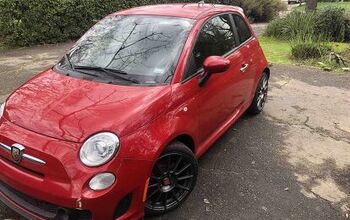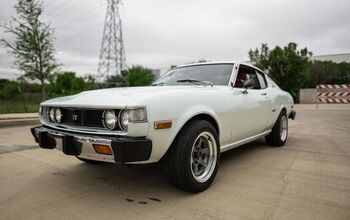Ask Bark: Did I Throw Away The Key To A New Car?

If there’s one thing I loved about spending time in the offices of General Managers and dealership principals, it was hearing about the harebrained schemes they had to bring customers into the dealership. GMs see an average of 80 or more vendors every single month — there’s always a new piece of software, a new way to buy inventory, even a new way to wash the windows. Invariably, due to some combination of pressure to meet unrealistic sales goals and the attractiveness of the sales rep, managers would fall for something that would make me shake my rather large head in disbelief.
The tough part was always maintaining a straight face when they told me about their plans. One of my fondest memories was listening to a GM explain that he had canceled all of his third party advertisers and ordered two Wacky Waving Inflatable Arm Flailing Tubemen. I wasn’t entirely surprised to see that the store was out of business 90 days later.
But one of my all-time, tried and true favorites is the “gypsy sale.” Click the jump to see our friend Greg’s question about these direct mail pieces and whether or not they actually work.
Dear Bark,
In my area (greater Charleston SC) there is a dealership that will
Why do some dealerships run these corny promotions? Do they ever
I’ve always wondered, as I threw my key in the trash, if I was tossing
Thanks,
Ah, one of my favorite Sunday Stories was based on this idea. I’m sure that all of you have received a few of these over the years — there’s typically some sort of generic-looking key glued to a postcard, with the promise of a chance to win a Brand New Car!!! and some deals that seem too good to be true (until you read the fine print). You probably threw it away, just like Greg did.
But there’s a reason why dealers keep doing them after all these years — they work. Well, kinda.
The biggest problem that the dealer faces with modern advertising is attribution. Back in the day when your local daily newspaper had multiple sections and dozens of pages of ads, it was easy. Prospective customers would see the dealership’s ad in the paper, and they would physically bring the advertisement into the dealership. The sales rep would take the ad and put it in the deal folder to show that the newspaper ad was the lead source. Boom. Done. Easy.
Nowadays? Oh, man. There’s a million lead sources, and it’s virtually impossible to attribute sales to any of them. Why? Well, even though most of them are digital, and should, in theory, be trackable, it’s not that easy. Almost nobody submits leads to the dealership through the web — they just see what they want online and show up at the dealership. (Cue the comments from people who still send emails. You’re the minority.) Therefore, it’s genuinely difficult for even the savviest of dealers to know if what they’re doing for advertising is actually working.
But the postcards? People still bring those in, and in surprising numbers. They typically skew a little more toward toward the subprime side, but that’s fine with most dealerships, because there’s a lot of money to be made in subprime.
The ones with the keys are mostly sent out in advance of “tent sales” by traveling sales organizations, hence the “gypsy sale” moniker. One sales guy I know calls these sales the “Invasion of the Commission Snatchers.” The dealer pays a hefty sum of money, upwards of $40k or more, to an organization who sends out the cards in advance of the sale and then comes in with a team of pre-screeners, sales guys, hard closers, and F&I guys for the weekend. After they write a bunch of deals that are sketchy at best and illegal at worst, they jump on a plane and head out to lay waste to yet another store. Do they sell a lot of cars? Typically, yes, but it’s a pyrrhic victory more often than not.
But to answer your question — yes, sometimes the keys do actually work. In fact, I was in a dealership in your state, a CDJR store in Myrtle Beach, when a customer’s key started a brand new Chrysler 300S right on the showroom floor. Legally, one of the keys that they send out has to work, but when you send out 20,000 pieces of mail, the odds are literally 1 in 20,000. The gypsy sale organizations will sell you an insurance policy if you like — roughly $5k or so — and if you buy it, they’ll cover the cost of the car on the odd chance that somebody wins. If you don’t, the dealership has to cover it.
Well, the general manager at this CDJR store didn’t buy the insurance. And as the local news station came and interviewed the winner, the poor GM just sat in his office with his head in his hands, knowing that it was probably his last day at the dealership. The sale continued, the bell kept ringing, but he was done (And he was right. The owner fired him the next day).
So there you have it. Yes, the postcards work — but often at a terrible price.
[Image: Gretchen Gunda Enger/Shutterstock]
Send your emails with your questions about buying and selling cars to barkm302@gmail.com, and follow Bark on Instagram @barkmfors. He’ll be your friend if you do.

More by Mark "Bark M." Baruth
Latest Car Reviews
Read moreLatest Product Reviews
Read moreRecent Comments
- Bill Wade I think about my dealer who was clueless about uConnect updates and still can't fix station presets disappearing and the manufacturers want me to trust them and their dealers to address any self driving concerns when they can't fix a simple radio?Right.
- FreedMike I don't think they work very well, so yeah...I'm afraid of them. And as many have pointed out, human drivers tend to be so bad that they are also worthy of being feared; that's true, but if that's the case, why add one more layer of bad drivers into the mix?
- ChristianWimmer I have two problems with autonomous cars.One, I LOVE and ENJOY DRIVING. It’s a fun and pleasurable experience for me. I want to drive my cars, not be driven by them.Two, if autonomous cars have been engineered to a standard where they work 100% flawlessly and don’t cause accidents, then freedom-hating governments like the POS European Union or totally idiotic current German government can literally make laws which ban private car ownership in their quest to save the world from climate change bla bla bla…
- SCE to AUX Everything in me says 'no', but the price is tempting, and it's only 2 hours from me.I guess 123k miles in 18 years does qualify as 'low miles'.
- Dwford Will we ever actually have autonomous vehicles? Right now we have limited consumer grade systems that require constant human attention, or we have commercial grade systems that still rely on remote operators and teams of chase vehicles. Aside from Tesla's FSD, all these systems work only in certain cities or highway routes. A common problem still remains: the system's ability to see and react correctly to obstacles. Until that is solved, count me out. Yes, I could also react incorrectly, but at least the is me taking my fate into my own hands, instead of me screaming in terror as the autonomous vehicles rams me into a parked semi


































Comments
Join the conversation
Collectively America has a gambling problem so ringing that Pavlovian bell is smart business. Everyone wants to be a "winner".
As a kid I remember we got one of those through the post. As I was car mad they gave the key to me - it looked very like a Ford Europe 80s key (presumably Ford US would've used the same, almost look like screwdrivers with a flat piece with notches in places?) Don't remember it being a dealer though, think it was something like Readers Digest, not sure how people tried the key, I think it was a prop and you phoned up with a code maybe. Then there are the raffles, take a £500 tradein, get the dealer valet to shine it up real nice, cover the scuffs and scrapes in "Win me!" stickers, offer raffle tickets - "oh and while you're here we have a very nice car would suit you...."